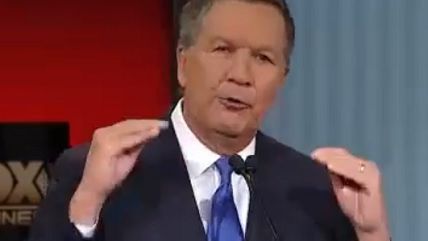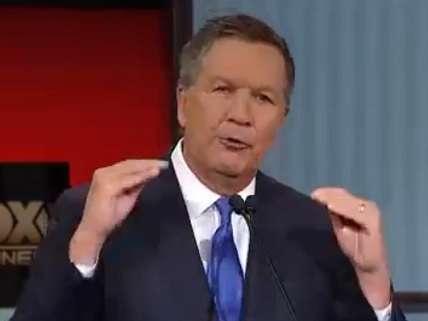John Kasich Offers Only Decent Answer on Police Reform, Criminal Justice
Only one other answer, from Chris Christie.


Despite Kentucky Sen. Rand Paul's absence from last night's Republican presidential debate stage, the topic of police reform did manage to come up a few times. The answers, however, weren't just disappointing from an ideological perspective, they were disappointing for lack of substance as well. Fox Business' Neil Cavuto asked New Jersey's Gov. Chris Christie what he would do as president for police chiefs who say that they feel "abandoned" by Washington and their officers are afraid of being "thrown in jail" for doing their job, and that that was leading to a spike in violent crimes in dozens of cities.
Christie's answer mentioned that he was a friend of the FBI director James Comey, because why not, and quoted him about "a chill wind blowing through law enforcement in this country." That was a reference to the so-called "Ferguson effect"—Comey claims police are worried about being videotaped and about additional scrutiny of police practices, and that that was causing a spike in crime. President Obama responded to those comments, urging people to "stick to the facts." But Christie didn't talk about the "Ferguson effect," he just threw an extra quote for Cavuto's question.
In the only close to substantive and relevant-to-the-topic part of the answer, Chrstie claimed the problem was that Obama and his attorney general "give the benefit of the doubt to the criminal, not to the police officers." Yet the Department of Justice (DOJ) declines to pursue police officers all the time, and police are rarely charged for on-duty shootings (41 officers in the 7 year period ending in 2014). When the DOJ reviews police departments as a whole, and there was been a commendable uptick in such reviews during the Obama administration, DOJ officials are always careful to insist criticisms of police department practices and "organizational deficiencies" that lead officers to use deadly force unconstitutionally aren't criticisms of individual cops.
Christie offered no defense of broken windows policing or other policies "law and order" conservatives often argue lead to lower crime rates, and offered no ideas for criminal justice reform of his own. Instead he moved on to sanctuary cities and marijuana legalization, saying he would order his DOJ to enforce the laws on illegal immigration and marijuana prohibition irrespective of what local and state jurisdictions have on their books.
This was presumably the part of the answer about what he'd do as president about the spike in violent crime. But sanctuary cities were first created in part to help police and reduce crime, by making illegal immigrants less afraid of coming forward as witnesses to crimes. And marijuana legalization is intended in part to shift policing resources away from non-violent, consensual behavior and toward violent crimes and to rob criminal organizations of a profitable source of revenue.
John Kasich, who is governor of Ohio, where a number of high-profile controversial police shootings have happened over the last several years, fared better, with the only other answer on criminal justice of the night. That was because he had some kind of record to run on. As he mentioned, Kasich set up a community-police advisory panel on reform that came up with nearly two dozen recommendations that have been identified as good practices, such as limiting the use of deadly force to only when there is an imminent threat to life and requiring body cameras.
Kasich was also able to make a broader point about criminal justice reform missed by most of the other candidates running for president (on both sides). "One of the issues has got to be the integration of both community and police," he said. That meant not only understanding that police want to be safe but that "law enforcement understands there are people in the community who not only think that the system doesn't work for them, but works against them." It's "about getting people to listen to one another's problems," Kasich said, a different kind of tip to bipartisanship than the "agreeing with us is political unity" brand dished out by the president Tuesday night.
Kasich's call could've also applied to a previous comment Donald Trump made at the tail-end of an exchange about his support of a temporary ban on the entry of Muslim immigrants into the United States. "And by the way, the police are the most mistreated people in this country. I will tell you that," Trump added.
The only other comment about the issue of police reform came at the very end of the debate, when Texas Sen. Ted Cruz in his closing statement (which started as a plug for 13 hours) said he promised when he was president, things like Hillary Clinton apologizing for saying "all lives matter" would end and that he'd have the back of that soldiers, sailors, police officers, and first responders.
The undercard debate did not feature the topic of criminal justice or police reform at all.


Show Comments (52)